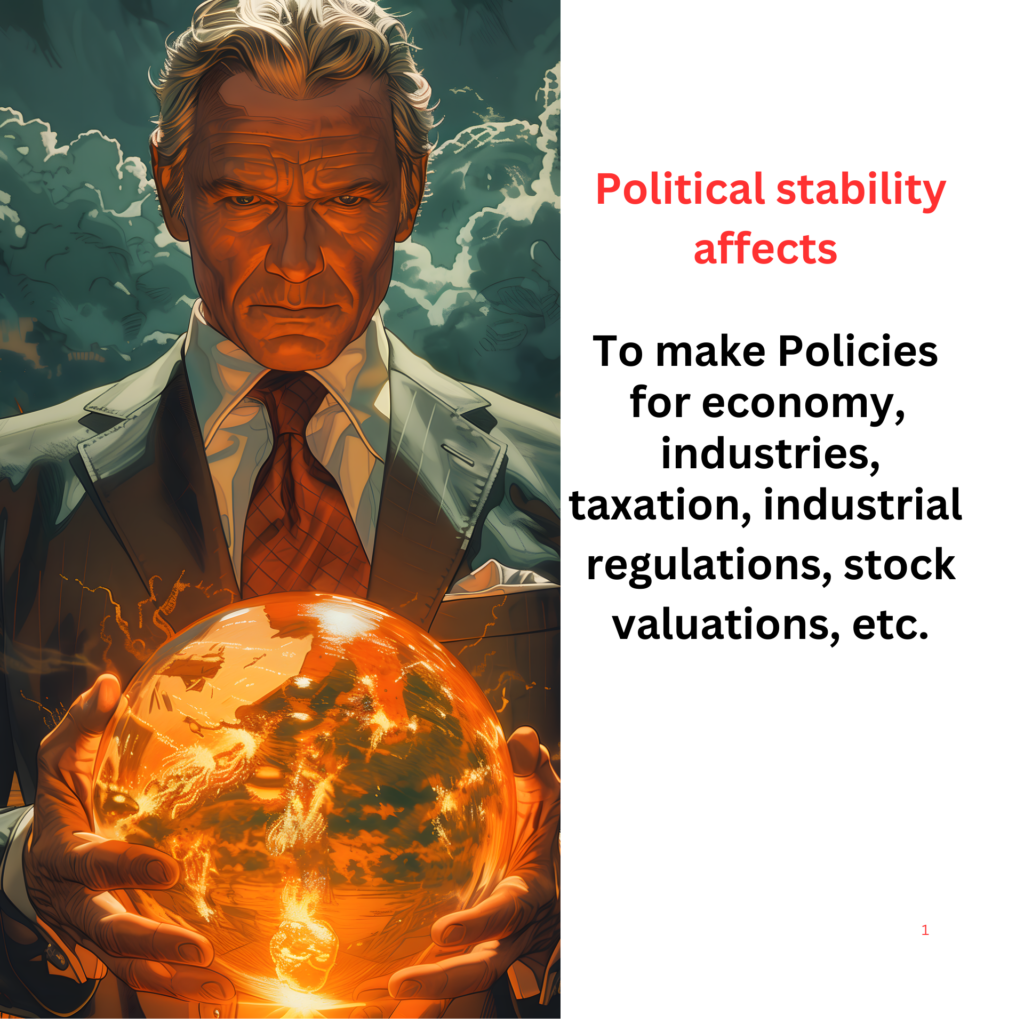Political stability is a fundamental pillar that directly influences the health of an economy, industries, and the stock market. It plays a pivotal role in shaping investor confidence and determining the country’s long-term growth trajectory. Here’s an in-depth analysis of its significance:

Role of Politicians in Policy Making:
Political leaders are not merely figureheads; they are the architects of economic and social policies. They are responsible for framing and reforming laws that aim at the comprehensive welfare of the population. Their policies directly affect taxation, industrial regulations, and trade, which in turn influence corporate profitability and stock valuations.
Link between Political Stability and Economic Growth:
The interdependence between political stability and economic development cannot be overstated. A stable political climate ensures consistent policy implementation, which leads to sustainable and balanced economic growth. A government focused on long-term strategies creates a conducive environment for businesses to thrive, fostering economic expansion.
On the other hand, political instability—marked by frequent changes in government or coalition struggles—can obstruct decision-making processes. This hinders major economic reforms and long-term planning, leading to uncertainty. Investors, both domestic and foreign, may hesitate to invest in such environments due to the unpredictability of policy changes, thereby slowing down economic progress.
Uncertainty and Investment:
Uncertainty is a significant deterrent to investment. In an unstable political atmosphere, investors often adopt a “wait and see” approach, fearing abrupt changes in fiscal and monetary policies. As a result, capital inflows diminish, reducing the funds available for industrial expansion and innovation. Prolonged instability can result in stagnant growth, while severe cases of political turmoil can destabilize the economy, leading to market volatility and potentially a government collapse.
Moreover, political shifts that introduce a new regime may cause a dramatic shift in economic direction, potentially undoing previous policies. This change in direction can unsettle markets, as businesses and investors are left in a state of flux.
Global Considerations:
In today’s interconnected global economy, the political stability of major global powers, including both developed and emerging economies, impacts the domestic economy. Trade agreements, diplomatic relations, and geopolitical events can significantly alter a nation’s economic performance, making international political stability equally critical.
In a capitalist economy, having a communist government isn’t usually favorable because the core principles of communism often clash with free-market mechanisms that drive economic growth. Communism typically involves more government control over industries, while capitalism relies on private enterprise and competition to stimulate economic expansion.
Long-Term Effects of Political Decisions:
Political decisions, whether good or bad, can leave lasting effects on a country’s economy. For instance:
- War decisions can divert resources from productive use, causing long-term economic strain.
- Leaks of sensitive information or corruption scandals can damage a country’s reputation and reduce foreign investments.
These events cause uncertainty, and investors tend to avoid economies with political instability, slowing down growth and development.
Importance of Global Political Stability:
In today’s interconnected global economy, the political and economic stability of other countries also impacts domestic markets. For example, a slowdown in China or the U.S., which are global economic powerhouses, can create ripple effects worldwide. Similarly, emerging markets like Brazil or India can face disruptions if there is political turmoil in any major trading partner country. As such, both domestic and global stability matter for sustained economic growth.
